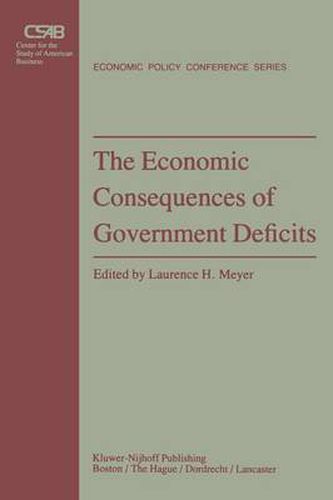Readings Newsletter
Become a Readings Member to make your shopping experience even easier.
Sign in or sign up for free!
You’re not far away from qualifying for FREE standard shipping within Australia
You’ve qualified for FREE standard shipping within Australia
The cart is loading…






This title is printed to order. This book may have been self-published. If so, we cannot guarantee the quality of the content. In the main most books will have gone through the editing process however some may not. We therefore suggest that you be aware of this before ordering this book. If in doubt check either the author or publisher’s details as we are unable to accept any returns unless they are faulty. Please contact us if you have any questions.
On October 29 and 30, 1982, the Center for the Study of American Business and the Institute for Banking and Financial Markets at Washington The Economic Consequences of University cosponsored a conference on Government Deficits.
This was the sixth annual Economic Policy Con ference sponsored by the Center, and the first it has cosponsored with the Institute. This book contains the papers and comments delivered at that conference. Recent and prospective large federal deficits have prompted a thorough reconsideration of the political sources and economic consequences of government deficits. The papers in Part I focus on the implications of deficits for monetary growth and inflation, and the papers in Part II consider the effect of deficits on interest rates and capital formation. The papers in Part III deal with the political sources and remedies for the explosive growth in government spending and increased reliance on deficits. The papers in Part I by Alan S. Blinder, Professor of Economics at Princeton University, and Preston J. Miller, Assistant Vice President and Research Advisor at the Federal Reserve Bank of Minneapolis, discuss the relation between monetary growth and deficits and present evidence on the of deficits on inflation and output. A deficit is said to be monetized effects vii viii THE ECONOMIC CONSEQUENCES OF GOVERNMENT DEFICITS when the Federal Reserve purchases bonds to aid the Treasury in financing the deficit.
$9.00 standard shipping within Australia
FREE standard shipping within Australia for orders over $100.00
Express & International shipping calculated at checkout
This title is printed to order. This book may have been self-published. If so, we cannot guarantee the quality of the content. In the main most books will have gone through the editing process however some may not. We therefore suggest that you be aware of this before ordering this book. If in doubt check either the author or publisher’s details as we are unable to accept any returns unless they are faulty. Please contact us if you have any questions.
On October 29 and 30, 1982, the Center for the Study of American Business and the Institute for Banking and Financial Markets at Washington The Economic Consequences of University cosponsored a conference on Government Deficits.
This was the sixth annual Economic Policy Con ference sponsored by the Center, and the first it has cosponsored with the Institute. This book contains the papers and comments delivered at that conference. Recent and prospective large federal deficits have prompted a thorough reconsideration of the political sources and economic consequences of government deficits. The papers in Part I focus on the implications of deficits for monetary growth and inflation, and the papers in Part II consider the effect of deficits on interest rates and capital formation. The papers in Part III deal with the political sources and remedies for the explosive growth in government spending and increased reliance on deficits. The papers in Part I by Alan S. Blinder, Professor of Economics at Princeton University, and Preston J. Miller, Assistant Vice President and Research Advisor at the Federal Reserve Bank of Minneapolis, discuss the relation between monetary growth and deficits and present evidence on the of deficits on inflation and output. A deficit is said to be monetized effects vii viii THE ECONOMIC CONSEQUENCES OF GOVERNMENT DEFICITS when the Federal Reserve purchases bonds to aid the Treasury in financing the deficit.